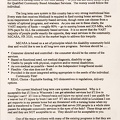Auberger, a National Organizer for the national disability rights group ADAPT. I use personal attendant services. As a C-4 quadriplegic I need assistance in bathing, dressing, transferring and other activities of daily living. I am also Executive Director of the Atlantis Community, an Independent Living Center which provides over $2.6 million in Medicaid Home Health Services to people with disabilities, both old and young, with mental and/or physical disabilities.
I'm testifying today on behalf of the thousands of people with disabilities who want to have REAL choice to live in the community and participate in what our country has to offer. 49 national, 114 state and 181 local organizations have signed on as MiCASA supporters. Look at the list at the end of my testimony, Across the nation the call is ringing out for MiCASA. We are tired of waiting.
Needing personal attendant services is not a crime, but thousands of people with disabilities are locked away in institutions because there are very few REAL options in the United States' long term care system. This system requires people with disabilities to impoverish ourselves, sell our homes, divorce our spouses, and lie. We are forced into more expensive programs that over regulate, over medicalize, over control, and demean.
It happens every day. I had to move from Ohio to Colrorado to receive attendant services, leaving a mother, a father, a sister, and a child behind. The only other choice? A nursing home. I would rather die then go to a nursing home. People need to have REAL choices.
We would not be here today had it not been for the heroic efforts of hundreds and hundreds of ADAPT members, who for the past seven years have put their bodies on the line. Who would have thought Speaker Gingrich and Minority Leader Gephardt would join forces with us on this bill? It's not as far fetched as it might at first seem. This bill was introduced, and this hearing was scheduled because it is a good idea; because there is a need; because it is the right thing to do.
HR 2020 the Medicaid Community Attendant Services Act, MiCASA, is a very simple concept. It would take the existing Medicaid entitlement programs for nursing homes and ICF-MRs and make them more flexible and consumer responsive. MiCASA says if you are eligible for a nursing home or ICF-MR you can choose to have the dollars that currently fund these programs pay for your services in a nursing home or ICF-MR facility or you can use these funds to pay for Qualified Community Based Attendant Services. The money could follow the individual.
The long term care system in this country has a very strong institutional bias. Every state that receives Medicaid is required to fund nursing home services. There is no requirement for community-based services, though states can choose from a variety of optional programs, and waivers. As you can see in these charts, the VAST majority of funds roughly 80% -- go to nursing homes and ICF-MRs, while 20% pays for ALL the community based services. It is no secret that the VAST majority of people prefer exactly the opposite, they want services in the community. MiCASA, HR 2020, would let the market begin to address this inequity.
MiCASA is based on a set of principles which the disability community hold dear and would like to see in all long term care programs. Services should be
* Consumer directed and controlled - the consumer should be the center of the services.
* Based on functional need, not medical diagnosis, disability or age.
* Usable by people with physical, cognitive and/or mental disabilities.
* As non-medical as possible - based on the Independent living/Social model.
* Flexible - One size does not fit all.
* Provided in the most integrated setting appropriate to the needs of the individual. Community First!
* REAL Choice - Equitable funding, NO disincentives in regulations, delivery options
The current Medicaid long term care system is fragmented. Why is it acceptable that if Y live in Wisconsin I can get attendant services but if I live in Georgia I can't? If I live in Pennsylvania and injure my spinal cord I can qualify for a waiver but if I injure by brain I am not? If I am a disabled child in Louisiana I can get supports in my parents home but am threatened with a nursing home when my dad is transferred to Texas? That a program that serves 200 people in a whole state passes for adequate community services in the eyes of the feds? These things are all real and they are NOT acceptable to us. They should not be acceptable to you.
One of the major problems with many of the existing programs is that they are based on a "medical model." If I need help remembering to take my medication why should it matter if this is because I have a brain injury, Alzheimer's or mental retardation? Why should it matter, when I need help getting out of bed and getting dressed, whether I need it because I have MS, cerebral palsy or a spinal cord injury?
No one is denying our health related needs. These may be medical in an acute setting but they are everyday living tasks in our everyday lives. Medication administration, bowel and bladder needs, tube feeding and even vent care can be performed by a qualified unlicensed attendant either through delegation or assignment by a health professional. In these states where this has been the practice for many years, quality and safety have not be compromised.
Over medicalization of services raises the real dollar costs of programs as well. At Atlantis, when I work, Medicaid allows us to charge $65 for a nurse's visit to catheterize or tube feed while allowing us to charge $35 for an attendant, trained and supervised, doing the same job.
For us this is not a matter of developing policy, it is a struggle for our lives and the lives of our friends and colleagues. You need to act now!
While we appreciate your holding this hearing, a hearing in Washington, DC cannot convey the intensity of feelings about this issue that I hear as I trawl throughout the country. ADAPT believes that one step this subcommittee can take as HR 2020 goes through the legislative process, is to hear from REAL people receiving long term care services. Schedule field hearings in targeted cities over the next 6 months. ADAPT offers to work with the Committee to make these hearings successful.
There's No Place Like Home!
- Created on
- Tuesday 16 July 2013
- Posted on
- Friday 8 November 2019
- Albums
- Visits
- 270
- Rating score
- no rate
- Rate this photo


0 comments